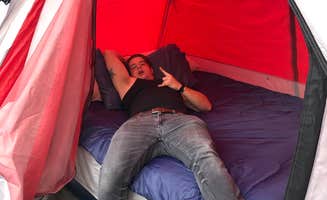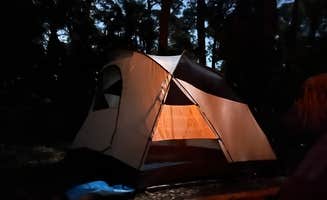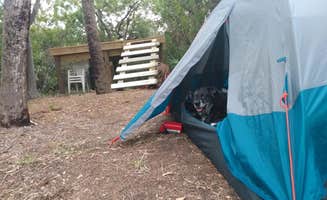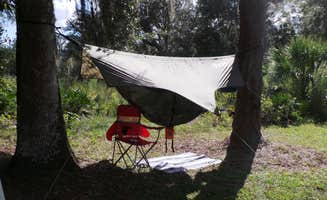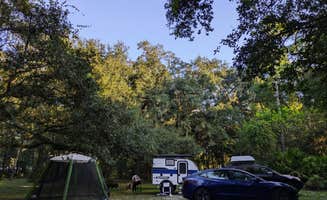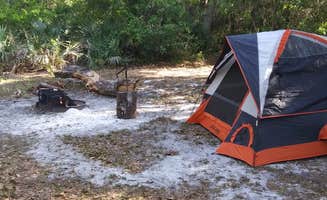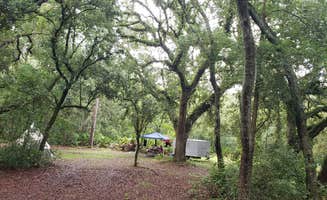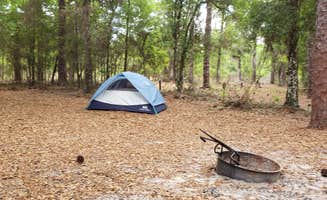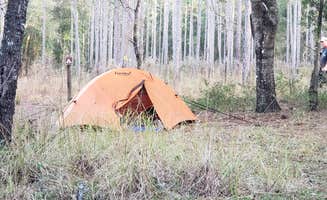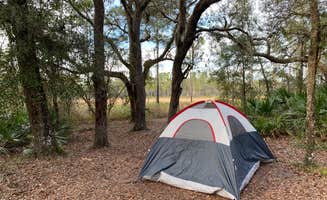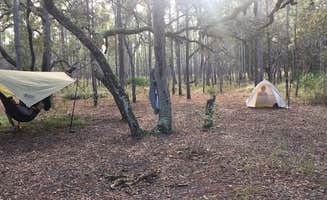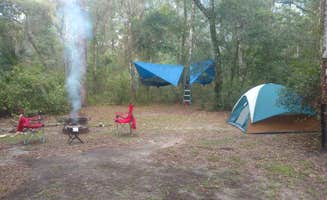Tent camping opportunities near Palm Harbor, Florida exist beyond the more developed state parks, with primitive backcountry sites available across surrounding conservation areas. The region's sandy soil and limestone bedrock impact campsite conditions, particularly during seasonal rains when water tables rise rapidly. Most campsites sit below 100 feet elevation, contributing to high humidity levels even in cooler months.
What to do
Paddling adventures: At Crooked River Campground in Withlacoochee State Forest, campers have direct water access for small boats. "We enjoyed a group paddle down the river for a few hours. We shuttled some cars down that way so we could paddle far down and ride back. And have a lunch at the campsite afterwards," notes one visitor.
Trail exploration: The trail system at Pasco County - Crews Lake Wilderness Park offers multiple hiking options. A camper observed, "Awesome park with well maintained trail. There are a lot of other small trails that lead off into the woods. If you wander, bring a compass and throw some az."
Spring swimming: Access natural spring waters at Lithia Springs Conservation Park, where visitors pay a small fee for swimming. "Nice spring to swim in for 2.00 a person. Most campsites are very shaded," reported one reviewer. The spring-fed swimming area remains consistently cool year-round, offering relief from summer heat.
What campers like
Site privacy: Tent campers consistently mention site seclusion as a benefit at Crooked River Campground. "There are a few group campsites here and some side by side, but most of the sites are secluded with dense forest in between each site. Tent camping only, with a picnic table, fire ring and water faucet," writes a camper.
Spacious campsites: At Jay B. Starkey Wilderness Park, campsite size stands out as a positive feature. "Campsite #9 has so far been my most favorite spot here. It's VERY spacious (could easily fit 5 large tents here) and the back of the site has a trail that leads directly to The McNeil Homestead."
Wildlife viewing: Terry Tomalin Campground offers abundant wildlife observation opportunities. "The campsites are nicely spaced out so you aren't too close to other campers. The trails are amazing but be careful or you might get lost," one visitor notes. Morning and evening hours typically provide optimal wildlife viewing.
What you should know
Water availability: Water access varies significantly between primitive and established sites. At Jay B. Starkey Wilderness Park, one camper advises about backcountry sites: "They have water stations, but do not count on these being full at all times. Bring water with you. Don't risk it!"
Weekend crowds: Several campers mention significant differences between weekday and weekend camping experiences. One reviewer noted about Jay B. Starkey Wilderness Park: "Site #14 is practically on top of 13 and 15 giving very little privacy. IF YOU ARE HOPING FOR PEACE AND QUIET, DO NOT GO ON A WEEKEND I went on a Friday night, and the entire campground was PACKED."
Site flooding: Tent pads can become waterlogged quickly during rain. A Crooked River Campground visitor reported: "It flooded very quickly during the few thunderstorms we experienced and there was some poison ivy in an easy to run into area. Worth noting."
Tips for camping with families
Playground access: Lake Park offers multiple family-friendly features near tent sites. A regular visitor noted: "This park has a really great walking trail around a lake with exercise stations. I've seen some horses on the trails also. There's a cool BMX and rc car track too!"
Kid-friendly water areas: Shallow water access points appeal to families with children. One camper at Crooked River Campground shared: "The kids really loved cooling off in the river and catching frogs, they all agree that this was their favorite part. We didn't see any gators, which was disappointing but I'll survive."
Educational opportunities: Many parks offer nature programs specifically designed for young visitors. At Jay B. Starkey Wilderness Park, a visitor mentioned: "Nature education center for children. Playgrounds and pavilions for get togethers. Large group bon fire pits and cabins for rent."
Tips from RVers
Site accessibility: Some tent camping areas can accommodate small camper vans but restrict larger RVs. A Lithia Springs Conservation Park visitor noted: "We enjoyed a two night stay at site 28. This site is set deep from the road and can accommodate a large rig. Completely secluded from neighbors."
Power options: Electric hookups vary widely between parks. At Lithia Springs Conservation Park, all developed sites "have fire rings, tables and power." This makes the park suitable for tent campers who need minimal electrical access for charging devices or running small appliances.
Proximity to supplies: Location relative to urban amenities matters for extended stays. One Lithia Springs camper appreciated: "Grocery stores within 2 miles which was great because the wife ran out of wine."


